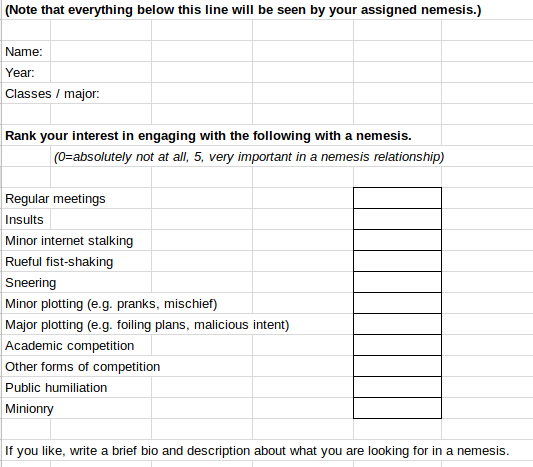[Cover photo taken by T. R. Shankar Raman, under a CC BY-SA 4.0 license.]
College season is starting soon and many, including me, will be returning to school soon. In that spirit, I thought I’d try and pitch the Eukaryotes Read Blog collective on an idea I never tried out in undergrad.*
On undergrad campuses, fall is a magical time. A lot of energetic new students have found themselves joining together, bereft of their previous friends and social networks, away from their family, drastically changing their lifestyles, and making it on their own in the world.
University campuses are well-equipped to help you make friends. There are plenty of campus-organized bonding opportunities in the first few weeks, and, if you’re like most people, you’ll end up making friends with roommates, classmates, other people on your floor, people you eat with in the cafeteria, etc.
What university campuses do not help you make are enemies.
Enemies are an important and time-honored form of human relationship. Beowulf had Grendel, Batman had Catwoman, St. Patrick had the snakes. But forming and nurturing early-stage enemyships can be difficult. Sometimes your enemy has killed your son and you’ve come to exact retribution, or you’re investigating the same murder, or you’re driving your enemy out of Ireland. But these opportunities are few and far between.
Don’t get me wrong. True nemesis relationships can happen early on in the college career. Maybe you were in a conversation with them about land management during your “get acquainted” circle in Orientation Week, and their opinions were so bad you wanted to punch them, and now they’re dating your roommate. But most people aren’t looking to make nemeses off the bat, and the stifling atmosphere of today’s college campuses – rife with memes like “be good to each other” – is simply not fertile ground for real adversarial relationships.
Without this release valve early on, nemeses tend to form painfully and explosively at random points throughout your college career, when you’ve already signed a 12-month lease with them. Eventually, they get increasingly awful, and you have to kick them out and suffer through a massive screaming fit that goes on all night when you have a six-hour O-chem lab the next day. Go fuck yourself, Amy.
I don’t want that. None of us want that. Enter Nemesis Club.
Upon joining Nemesis Club, you fill out a form. It asks for your name and class standing, and goes into what you’re looking for in a nemesis.

A sample nemesis-matching survey.
Over the next week, organizers match you with another participant with similar needs and desires. Congratulations! You now have a nemesis. While you make friends, reorient your life, and try to ace your classes, this friendly face will be there to curse, shake your fist at, and plot against.
There’s a tricky balance here – society has poorly equipped us for the nuances of the comradversarial relationship, so the club has to be ready to help members navigate this. What if two nemeses have different assumptions about the seriousness of the enemyship? What if people are unhappy in their nemesis bonds?
It’s important that these bonds be navigated carefully. Ideally, these relationships will be satisfying. Maybe they’ll lead to academic success, grudging friendship, or romance. Maybe at the end of the college career, both nemeses will set aside their grudges and continue their lives as pals. Or maybe, if we’re lucky, these connections will blossom into life-long rivalries.
If anyone starts a nemesis club, or some variation of it, do let me know.
- My ex did actually briefly try to start this. I declined to participate because he refused to take out “physical violence” as a club-endorsed nemesis activity (between willing participants). I admire his commitment to the aesthetic, but have to disrecommend this approach if you’re planning on starting your own, for reasons both of legitimacy and of gaining members that really don’t want to be involved with something that includes physical violence (which is to say: most people).

